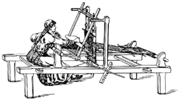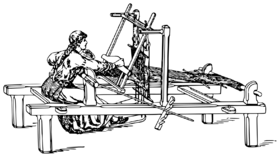Ghost work 2019/09/26
De teixidora
Quan: des de 26-setembre-2019 fins a 26-setembre-2019 · Hora: 15:00 - 13:45· On: Parc Tecnològic de Nou Barris, Carrer Marie Curie, 8-14, 08042 Barcelona · (mapa) · Llengua: en-anglès Organitza: OuiShare
Hashtag:##RWBCN19_Xarxes socials:
Reshaping Work Bcn 2019. Evento regional organizado por OuiShare en el que se reunen académicos, responsables políticos, líderes empresariales y trabajadores de plataformas digitales para pensar sobre el futuro del trabajo y paradar forma a un nuevo contrato social.
“… Ghost work
Documentació d'aquesta sessió
· ![]() apunts ·
apunts ·
 Apunts i cròniques
Apunts i cròniques
Apunts presos a l'esdeveniment, cròniques, ressenyes i documents de conclusions.
Apunts
Apunts copiats al wiki:
https://pad.femprocomuns.cat/RW_GhostWork
Sara Barbel: Pone sobre la mesa el trabajo que ha realizado Mary L. Gray para identificar el trabajo oscuro (fantasma) desde otras partes del mundo y através del control que la tecnología hace de nuestras vidas.
La tecnología no crea desigualdades, sino nuestras decisiones; un aspecto clave de la obra de Gray. Habrá destrucción y creación de trabajo pero todo radica en qué modelo social vamos a generar: un modelo que agudize la precariedad o uno que formule un nuevo contrato social: redistribución del trabajo. Para ello se requiere voluntad política.
---
I am going to start with a provocation: We should rethink what is the problem that we are trying to solve.
Ghost work: we are not talking about niche jobs that are going to take away when robot arrive. We are introducing the end of full-employment.
Labour conditions that platform is creating:
The Human computation into platform work
These are not automathic mechanisms, they are just software. The value of these platforms is not only that they can mach to sides, if not that they agreegate a mass (demand and supply side). Any task that can be outsourced thorugh an API is right for this type of economy, it is the main reason why it makes something that goes beyond a niche market.
Online-to-Offline platform services such as deliveroo, fiverr, uber, etc. are not the only times of companyies. Also they are different but they are monoplizing the discourse and have something in common they use automating tools but also the content moderation is another task that requires human computation
The world tha twe used to miss it is the on-demand online -to-online information services. These platforms include examples as upwork, loop, legion etc.
Two types of work:
1) Structuring and cleaning:
2) "Human-in-the-loop" Information services
We have an oppprtunity to set a new type of rules to ensure that these type of jobs are not bad. It is important to note that picework has occured several times in history when technology was not ready.
In history, always there have been people who have finished this last-mile that technology has not aviable to complete the task.
Gost work is the collision of
1800s: Policies built for full-time
1960s: Internet-enabled global suply chains
2000s: Shift to information service economy: 24/7 delivery
Today as consumer we buy more experiecnes than things. Most of our jobs are not related with manufacturing. All is about deliveryng a human response.
Methodology: We took thousands of surevys, interviewed people, fieldowrk, behavioral experiences, transaction data anlysis of 4 different companies.
Sample: lead genious (https://www.leadgenius.com/), amt, amara (translation site to the deaf, msft universal human relevance system.
We studied thousands of workers across Unitated States & India (really distributed)
Findings:
1) Platform work creates a pareto distribution participation: 10% of workers rely on these platforms as full-income (always on). 20% where regulars, they workerd several hours a week. There is no way for them to become full-time workers. 70% of them are called experimentlist they try it two or three times and leave the paltform.
2) Emergent Mental maps: This means that they have diferent beliefs regarding what they work means. There are different kinds of workers on this labour market and all of them are valuable. This is what is new that you can have one person for full. time and others for one hour. If you asked them what do they do they will have differnet descriptions, the only common thing is that they would do the same thing. This is why whe can no tmeasure this with traditional research methodologies.
3) Collaboration can Counter Ghost Work Conditions:They can conneect with each other online forums
Why do people do this? - Agency
What are the other opportunities avaiable.
- Control time (e.g. schedules) It is not fair to call it about flexibility it is people that are trying to control their time. For women it is to try to manage their schedules of care.
- Control projects (e.g.opportunities, interests) People do not want a stable careeer,
- Control Work Environment (e.g. peers, location, commute) People are motivated by reorganising their lives, not sub them to their job.
Where do we go from here?
1. There is no signle work site. there are different realities. - No single work-site
2 No sole "employer or record" they are workers because they are doing task and sometimes this also involves the role of consumer as an employeer.
3. No unifying professional indentity/career -->
4. Globally-networked, independent workforce --> this is neither local and gloal issue it is glocal. We need international la ws that govern "on-demand" employment (that stop labor arbitrage)
5. Need international laws
6. We need new economic models that value a commons of shared abundance (vs surplus labor). We do not have an economic model to how we should value that "people common"
Q. How to solve the current labour situation?
A: She calls for regulation. We never in history have a moment that market solved how to treat labour. This is not a merket problem it is a social problem We need new rules.
Q. Do you think that one solution would be consumers to use less the technology?
A: We all have the choice. It is one option. As a consumer you should always think what is happening with our data. But, there is a lot of value we can get from this.
Q: How does goes work impact on gender?
A: It is complicated. We know that there is some degree of equal gender participation, there are people who do not identify themselves and that they participate in this type of work because of dicrimination. Women and man are working in different hours.
el taller ![]()
Col·labora completant o afegint la documentació que falta.
Hi ha: > ![]() apunts o cròniques
apunts o cròniques
No s'ha incorporat documentació de:
-
 Presentacions o material projectat
Presentacions o material projectat -

 Imatges
Imatges -
 Vídeo
Vídeo -
 Àudio
Àudio
Teixim connexions
Teixim una xarxa de connexions partint d'aquest esdeveniment'. Extraiem i etiquetem continguts de la documentació generada per explorar relacions amb altres esdeveniments, identificar narratives, elements pel debat i generar cartografia dels actors implicats.
 Metadades
Metadades
Informació estructurada de l'esdeveniment que permet connectar-lo amb altres continguts a Teixidora.
Paraules clau: economia de plataforma, sharing economy, plataformes col·laboratives, treball, algoritmes, drets laborals, empresa, startups
Mostra paraules més freqüents al text
Intervinents: Mary L Gray, Sara Berbel
Persones mencionades:
Projectes mencionats:
Organitzacions mencionades: Harvard Berkman Klein Center, Microsoft Research, Ajuntament de Barcelona
Llibres i publicacions citades:
 Diagnòstic
Diagnòstic
Diagnòstic i/o avaluació que s'ha fet a l'esdeveniment.
Riscos / debilitats / mancances
Oportunitats / fortaleses
Propostes
el taller ![]()
Col·labora estructurant els resultats a partir de la documentació existent
A més dels resultats mostrats en aquesta pàgina, Teixidora permet mostrar de forma estructurada els següents resultats:
- Cites (què s'ha dit)
- Alternatives
Si creus que d'aquesta sessió se'n poden extreure alguns d'aquests resultats edita la pàgina i posa-ho a les caselles previstes a la secció "resultats".
Lloc
Mapa d'ubicació
Localització: Parc Tecnològic de Nou Barris, Carrer Marie Curie, 8-14, 08042 Barcelona ·
el taller 
![]() Afegir a teixidora esdeveniments similars a aquest
Afegir a teixidora esdeveniments similars a aquest
(es copiaran els continguts principals però no el títol ni el buidat)
Afegir esdeveniment que sigui...
![]() amb mateixos organitzadors i lloc
amb mateixos organitzadors i lloc ![]() al mateix lloc
al mateix lloc
![]() Reutilizació de continguts : els continguts de teixidora es poden re-publicar en viu a altres webs.
Reutilizació de continguts : els continguts de teixidora es poden re-publicar en viu a altres webs.
![]() sindicació Atom d'aquesta pàgina
sindicació Atom d'aquesta pàgina
![]() sindicació RSS d'aquesta pàgina
sindicació RSS d'aquesta pàgina
![]() Afegir a un calendari amb iCal
Afegir a un calendari amb iCal




